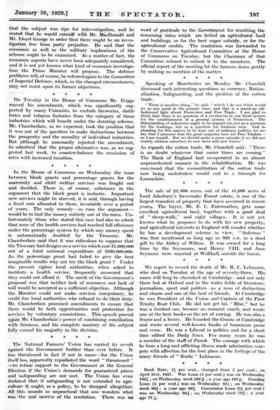In the House of Commons on Wednesday the _issue between
block grants and percentage grants for the maternity and child . welfare services was fought out and decided. There is, of course, substance in the argument that the block grant is inelastic. Important new services might be starved, it is said, through having a fixed sum allocated to them, invariable over a period of _years. The only remedy—so runs the argument— would be to find the money entirely out of the rates. Un- fortunately those who stated this case had also to admit that. none of the health services had reached full efficiency under the percentage system by.which any money spent is automatically doubled by the Treasury. Mr. Chamberlain said that it was ridiculous to suppose that the Treasury bad designs on a service which cost £1,000,000 out of a total national expenditure of £833,000,000.. As the percentage grant had failed to give the best imaginable results why not try the block grant ? Under the present regime local authorities, when asked to institute a health. service, frequently answered that they could not afford it. The merit of the Government's proposal was that neither lack of resources nor lack .of will would be accepted as a sufficient objection. Although the Minister could not make services compulsory, he could fine local authorities who refused to do their duty. Mr. Chamberlain promised amendments to ensure that there would be both opportunities and protection for services by voluntary associations. This speech proved again Mr. Chamberlain's power of combining conciliation with firmnesi, and his complete mastery of his subject fully earned his majority in the division. •








































 Previous page
Previous page